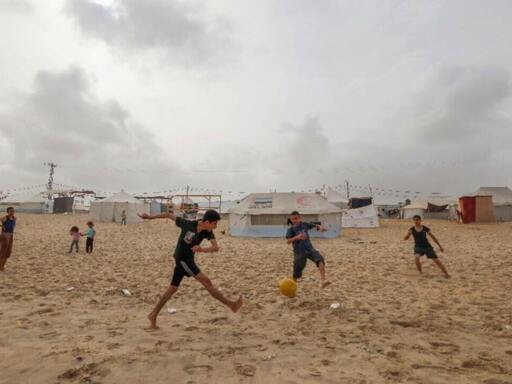In Gaza, death has left no room for neutrality – nor for football. The green field is free of weapons, and the stands are empty of threats, but rockets have mercilessly pierced the heart of the sport.
The death of football in Gaza: a silent witness to Israel’s genocide
This is not just a cancelled match or a postponed tournament, but a story about a sport that has been wiped out in its entirety. The ball that used to bring young people together in the alleys and playgrounds is now a silent witness to their absence, rolling in the void with no one to touch it.
Here, it is not the referee who blows the whistle, but the rockets; it is not flags that are raised in celebration, but bodies on shoulders; it is not the commentator who shouts with joy at a goal, but the muezzin calling for funeral prayers.
For the youth of Gaza, football was more than a game; it was a temporary respite from the siege, a window to a dream bigger than the boundaries of the land, but the occupation saw it as a threat that warranted bombing.
No element of the game was spared: the players died dreaming of better stadiums, the coaches left before they could explain their plans, the referees were targeted without a chance to blow the final whistle, and the fans were buried under stands that had been reduced to ruins. This is not just a sports story, but a testimony to a silent genocide that targeted one of the faces of life in Gaza, carried out without fanfare or protest.
The players: dreams killed before they were realised
At the Yarmouk Stadium, the locker rooms were empty of the players’ laughter. Many of them died as martyrs, buried with the dreams they carried as symbols. Mohammed al-Malouf (23), a striker for Jabalia Youth Club known as “the fast horse”, was killed in a bombing that targeted his home. Ninety-five players were children who dreamed of reaching the world stage and carrying the Palestinian flag in tournaments, but the occupation ended their lives and dreams, adding them to the list of martyrs.
The occupation deliberately killed dozens of players who represented the Palestinian national football team, many of whom were talented players who dreamed of becoming like Messi and Ronaldo.
Al-Yarmouk Stadium, one of the most famous historical Palestinian stadiums, hosted thousands of matches, and everyone in Gaza has memories of it, whether they were players, fans, or children who dreamed of one day playing on the green grass. No one imagined that some of them would be buried in this stadium after the occupation turned it into a mass grave and a detention center for civilians.
The coaches: tomorrow’s strategies stopped at death
In Gaza, where football dreams grew with every training session and every new lineup, the coaches sat down to draw up tomorrow’s strategies, distribute the players, and determine who would lead the attack and who would stand in defense. But the war approached relentlessly, and death did not wait.
Tomorrow was stolen from them before it began, turning their fields into rubble and their hearts into pits of pain. They were creating heroes on the field, only to find themselves fighting a battle that only those who persevere can win.
They planned for victory, but realised that survival had become the greatest challenge, and that soccer was a dream postponed behind a wall of smoke and tears.
The referees: whistles powerless in the face of death
The referee’s whistle, the sound that regulates the game, was unable to stop the bombing or protect the innocent in Gaza.
International referee Hani Masah, known for his calm demeanor, only raised the red card when necessary, but the bombing did not give him a chance to make his final call, and he died a martyr, like some of his colleagues who were killed or injured during the war. Their whistles were a symbol of order, but no order can control aircraft that do not distinguish between civilians and athletes, between players and combatants.
The referees used to officiate matches in front of thousands of fans, but some of them left without a funeral or even a few people to see them off.
The fans: silent stands, death in attendance
The stands collapsed under direct bombardment, so neither the audience nor the players were present. The only attendees were missiles and aircraft. Entire families of football fans died in their homes or places of refuge, and Gaza, which used to be decorated with the colors of local clubs, became a city engulfed in darkness.
The world is silent: institutions that do not see the blood. Despite documented reports and testimonies, no serious position has been taken by FIFA or international sports federations, as if the lives of Palestinian players are outside the scope of “sportsmanship”. Israel has killed all elements of the sports system, but continues to play at the international level without sanctions, while other countries have been sanctioned for their wars.
There is no football left in Gaza
In Gaza, there are no teams, no referees, no coaches, and no fans left. There are no more matches, only heavy silence, a destroyed stadium, and blood on the dry grass: this is where football used to be… and it has been completely killed.
The Palestinian Sports Media Union reported that Israel’s war of extermination on the Gaza Strip, now in its 23rd month, has resulted in the deaths of nearly 800 Palestinian athletes, including nearly 400 football players and 95 children, and the destruction of 273 sports facilities.
Israel destroyed all five official stadiums that used to host thousands of fans, turning them into either mass graves or displacement centers for thousands of families who found no place to pitch their tents except these burned-out stadiums.
Featured image via the Canary
By Alaa Shamali
From Canary via this RSS feed


